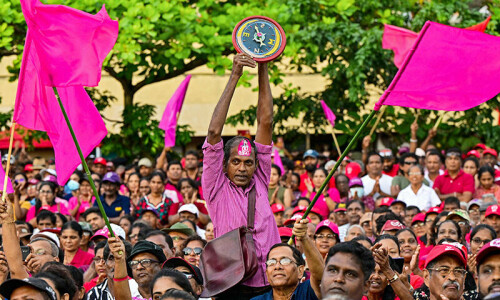COLOMBO: Sri Lanka’s new government has approved a controversial restructure of $14.7 billion in foreign commercial credit tentatively agreed by its predecessor, the finance ministry said on Saturday.
Former leader Ranil Wickremesinghe announced a deal with international sovereign bondholders and the China Development Bank just two days before he lost presidential elections last month.
The new leftist President Anura Kumara Dissanayake had called for better terms, but after two days of talks with an IMF delegation in Colombo, his government said it would honour his predecessor’s deal.
“Sri Lankan authorities confirm their endorsement of … the agreement in principle terms as announced on Sept 19,” the finance ministry said in a statement.
The debt restructuring is a key International Monetary Fund demand to rebuild the island’s economy, which suffered its worst crisis in 2022 when it shrank by 7.8 per cent.
In June, the government concluded a deal with its bilateral lenders to restructure its official credit amounting to $6bn.
Under the deal announced on Sept 19, private creditors holding more than half of international sovereign bonds and foreign commercial loans to the South Asian nation agreed to a 27pc haircut on their loans.
They also agreed to a further 11pc reduction on the interest owed to them. International sovereign bonds account for $12.5 billion and the balance of $2.2bn is owed to the China Development Bank.
Sri Lanka’s external debt stood at $46 billion at the time of its foreign debt default in 2022, when it ran out of foreign exchange to finance even the most essential imports such as food and fuel.
The bond restructuring endorsed by the new government must still go to parliament for ratification.
Dissanayake dissolved the assembly days after he was sworn in and called a snap election for Nov 14, a year ahead of schedule. The legislature is set to have its first session on Nov 21.
Austerity measures in line with the IMF bailout loan of $2.9bn secured last year helped stabilise the economy but also caused severe hardships for low income Sri Lankans.
The IMF has said that Sri Lanka returned to growth in the wake of the crisis, but warned its economy was still not out of the woods.
Published in Dawn, October 6th, 2024














































Dear visitor, the comments section is undergoing an overhaul and will return soon.